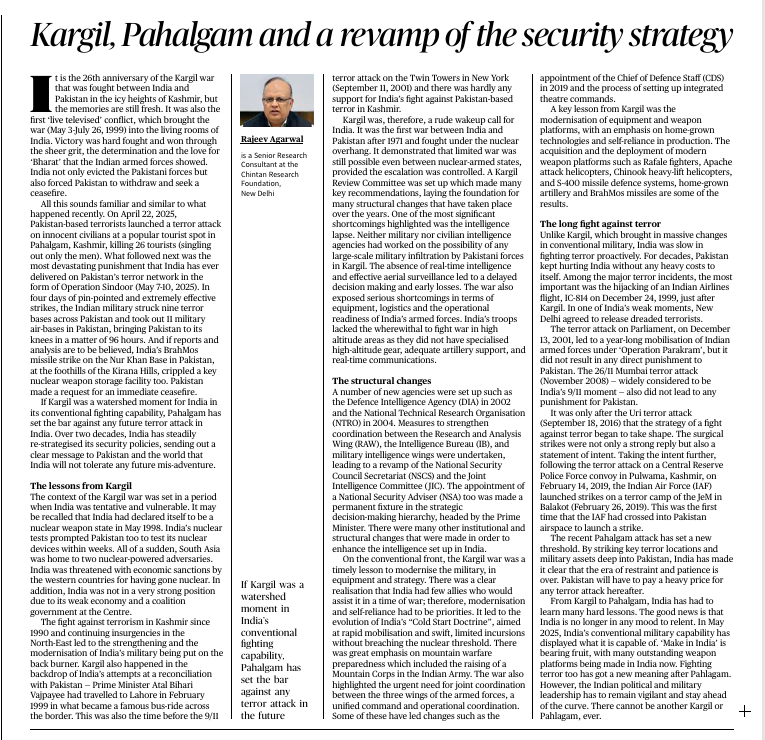Context:
- Kargil War (1999) and Pahalgam attack (2025) are compared to understand how India’s security strategy has evolved, especially in dealing with Pakistan-backed terrorism.
Main Points:
1. Pahalgam Attack (2025) – Trigger for Review
- April 22, 2025: Terrorists attacked a tourist spot in Pahalgam, Kashmir, killing 26 civilians.
- Attack was similar in intensity and surprise to the Kargil intrusion.
- Indian response: Swift and punitive – bombing terror camps in Pakistan and disabling critical assets like the Nura Khan air base and Kirana Hills missile base.
- Pahalgam has led India to re-evaluate and strengthen its counterterrorism strategy.
2. Lessons from Kargil (1999)
- Kargil occurred when India was perceived as a nuclear-weak state, just after it declared nuclear capabilities in 1998.
- Intelligence lapses were a major issue – both military and civilian agencies failed to detect large-scale Pakistani infiltration.
- The Kargil Review Committee led to long-term structural reforms:
- Creation of National Security Advisor (NSA)
- Joint operations among R&AW, IB, and DIA.
- Formation of NTRO, NSCS, and JIC.
- Revamped military doctrines, including Cold Start Doctrine.
- Focus on surveillance, precision weaponry, and network-centric warfare.
- Creation of National Security Advisor (NSA)
3. Strategic and Technological Changes Since Kargil
- India developed indigenous weapons (e.g., Rafale, Tejas, Akash missiles, BrahMos, Pinaka).
- More focus on:
- Cyber warfare, space-based surveillance, and artillery support.
- Joint operations, tri-service integration, and the appointment of Chief of Defence Staff (CDS).
- Cyber warfare, space-based surveillance, and artillery support.
4. Weaknesses in Counter-Terror Response
- Despite Kargil reforms, India was slow to respond to asymmetric attacks like:
- 2001 Parliament attack
- 26/11 Mumbai attacks (2008)
- 2001 Parliament attack
- These events exposed gaps in response speed and deterrence.
5. India’s Proactive Posture Post-Pulwama (2019)
- Pulwama attack (2019) marked a shift to preemptive strikes:
- Balakot air strike destroyed a terror camp inside Pakistan.
- Established India’s will to respond to terrorism beyond its borders.
- Balakot air strike destroyed a terror camp inside Pakistan.
Conclusion: A New Red Line
- The Pahalgam attack (2025) is being viewed as a new Kargil moment.
- India’s response shows:
- No tolerance for Pakistan-sponsored terrorism.
- A permanent shift in India’s national security doctrine — from reactive to preemptive and punitive
- No tolerance for Pakistan-sponsored terrorism.
Message to Pakistan: “No Kargil or Pahalgam again.”


